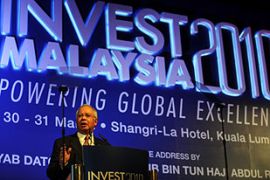Malaysia unveils new economic plan
Move unveiled to review longstanding race-based policy to reduce poverty and inequality.

Najib called the long-promised economic reforms a “bold transformation” when unveiling them at an investment conference in Kuala Lumpur, the capital, but the lack of detail has prompted scepticism.
He told delegates the objectives of the existing programme, known as an affirmative action policy, are still relevant “but it is time to review its implementation”.
‘Eradicate poverty’
It will now be need- and merit-based, rather than race-based, with the top priority to “eradicate poverty, irrespective of race”, Najib said.
|
“[Our] top priority is to eradicate poverty, irrespective of race … So there will be a renewed affirmative action policy … It will focus on the needs of all our people” Najib Abdul Razak, Malaysian prime minister |
“So there will be a renewed affirmative action policy … It will focus on the needs of all our people,” he said.
Najib said the government will no longer tolerate practices that support “the behaviour of rent-seeking and patronage”.
The NEM is designed to boost economic growth so that Malaysia achieves the income levels of a “rich” nation by 2020, more than double its $7,000 per capita income of today.
If implemented the proposed economic reform would be Najib’s boldest policy move since taking office last year.
“In the short term, there will be entrenched opposition,” Najib said, in an apparent reference to his Malay voter base which forms about 55 per cent of the 28 million population.
“But for the long-term strength of our nation, we cannot afford to duck these issues any longer.”
Public consultation
The full list of plans will be announced formally in June, after the government has obtained public feedback.
Critics have long said that the race-based policies have hurt investment and fostered graft.
| In video |
|
Al Jazeera’s Laura Kyle reports on Malaysia’s newly-unveiled proposed economic reforms |
The affirmative action policies were first known as the New Economic Policy. They were implemented by Abdul Razak Hussein, Najib’s father, in the wake of the 1969 race riots in an attempt to balance the inequalities between poor Malays and the country’s ethnic Chinese and Indians.
Najib’s proposed reform comes at a time when Malaysia is losing its attraction as a low-cost investment destination to other countries in the region such as Vietnam and Indonesia.
In view of that, the NEM proposes reducing subsidies and in raising education levels.
Najib said that two subsidiaries of Petronas, the state oil giant, would become listed companies and that the Employees Provident Fund, a state fund, would sell some of its holdings to boost liquidity on the stock market.
“It is encouraging that the government is moving along in the divestment process, but we were disappointed that there was no concrete timeframe for some of the reforms,” Alvin Liew, an economist at Standard Chartered bank, told Reuters news agency.
Declining investments
Political uncertainty in Malaysia since the 2008 elections – which saw the ruling coalition lose five states to an opposition alliance – has hit net portfolio and direct investment outflows to the tune of $61bn in 2008 and 2009, official data shows.
Malaysia’s economy shrank by 1.7 per cent in 2009.
The country once accounted for half of total capital inflows into southeast Asia’s emerging economies that included Thailand, Malaysia and Indonesia, but increasing competition means it now accounts for about a third.
A strong export-led rebound this year will likely see the economy grow by 4.5 to 5.5 per cent, Malaysia’s central bank has said.
The NEM aims to raise economic growth by 6.5 per cent annually.